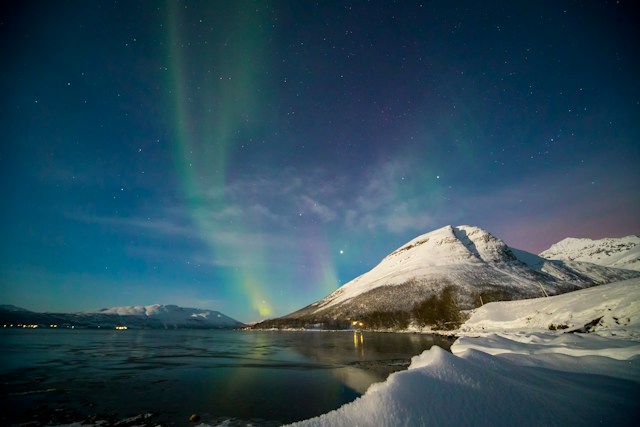Editor’s note: There is no way mining can be done in a “sustainable way and with acceptable consequences,” whether it is on land or in the sea. It is not a question of if we don’t, we will have to continue to use open pit mines and mountaintop removal. These forms of mining will continue regardless. Deep sea mining will only add to it. Norway likes to be perceived as a net-zero hero but the reality is that behind all of those electric cars and heat pumps, Norway is a major exporter of fossil fuels, and uses the income to pay for the new technologies. And now Norway wants to be a leader in deep-sea mining, too. This demonstrates that Norway is a country that cares little for the natural world if it means giving up its extractive economy for the conviences of a modern lifestyle. If mining is involved, there will be no green transition.
Elizabeth Claire Alberts/ Mongabay
Norway’s parliament has voted to allow deep-sea mining to commence in the Norwegian Sea, a move that has garnered criticism from scientists and environmentalists: While the Norwegian government insists that it can conduct deep-sea mining in a sustainable way, critics say these activities will put marine ecosystems and biodiversity at risk.
The Skandinavian country will open a 281,000-square-kilometer (108,500-square-mile) area of the ocean for deep-sea mining, which mostly falls along its continental shelf.
This result was already anticipated in December 2023 after Norway’s minority government negotiated a deal with opposition parties to open up the ocean off Norway’s coast to deep-sea mining.
Companies will now bid for exploration licences
The government previously proposed opening a 329,000-square-kilometer (127,000-square-mile) portion of the Norwegian Sea to deep-sea mining. However, this was later reduced to 281,000 km2 (108,500 mi2), an area nearly the size of Italy. Most of this region falls across Norway’s extended continental shelf, which is technically in international waters, but over which Norway has jurisdiction. Another portion falls within the territorial waters of the Svalbard archipelago, which Norway claims as its own exclusive economic zone, although this is contested by nations such as Russia, Iceland, the U.K. and several EU countries.
Experts say they believe the next step could be the Norwegian Offshore Directorate, the government agency responsible for regulating petroleum resources, inviting companies to bid for exploration licenses, which could happen as early as this year. However, there’s currently no public timeline of forthcoming events.
Norway intends to mine for minerals such as magnesium, cobalt, copper, nickel and rare-earth metals found in manganese crusts on seamounts and sulfide deposits on active, inactive or extinct hydrothermal vents. The government says seabed mining is necessary to ensure that Norway is able to succeed in a “ green transition.”
“We need to cut 55% of our emissions by 2030, and we also need to cut the rest of our emissions after 2030,” Astrid Bergmål, Norway’s state secretary for the energy minister, told Mongabay. “So, the reason for us to look into seabed minerals is the large amount of critical minerals that will be needed for many years.”
Critics, however, say that minerals for renewable energy technologies could be obtained from land-based sources and recycling processes.
Doubts about “clean” deep-sea mining
Bergmål said deep-sea mining will be done in a “step-by-step approach” and that it will only be permitted to go forward if the Norwegian government can ensure it will be done in a “sustainable way and with acceptable consequences.”
“If there is one country that can do this in a stepwise manner … that is Norway,” Bergmål said, “because when we say that we are going to put the world’s highest standards with respect to environmental concerns, we do it in practice.”
Norway isn’t the only country with ambitions to mine the deep sea. Other nations, including the Cook Islands, China and Japan, are working on similar plans within their own jurisdictions.
https://youtu.be/8bh_-WHU0BM?feature=shared
Deep-sea mining explained in 5 minute video
The high seas, which are areas beyond national jurisdiction, have also been earmarked for seabed mining, particularly in a region of the Pacific Ocean known as the Clarion-Clipperton Zone, where there are vast expanses dotted with potato-shaped polymetallic nodules containing minerals like manganese, nickel, cobalt and copper. The International Seabed Authority (ISA), a U.N.-mandated mining regulator, has been overseeing negotiations to approve a set of rules that would govern this activity so it could potentially start in the near future.
Protesters ready to stop seabed mining industry
Peter Haugan, a scientist who serves as policy director of Norway’s Institute of Marine Research and director of the Geophysical Institute at the University of Bergen, said Norway’s plans go against scientific advice and could endanger marine biodiversity.
“Destroying very sensitive and vulnerable areas and eliminating biodiversity … is a real risk,” Haugan told Mongabay. “It’s really a sad day for Norway.”
Haugan said Norway’s decision could also be a “violation of the law” due to a lack of scientific evidence needed to assess the environmental impacts of future mining activities, which is legally needed for such decisions to be made.
Haldis Tjeldflaat Helle, a campaigner at Greenpeace Norway against deep-sea mining, who participated in a protest outside the Norwegian parliament on Jan. 9, said she’s still hopeful that environmentalists will be able to stop the industry before it goes ahead.
“We will use the tools we have available,” Helle told Mongabay. “We will continue to do activism against this disruptive industry and try to influence Norwegian politicians to stop deep-sea mining.”
Elizabeth Claire Alberts is a senior staff writer for Mongabay. Follow her on Twitter @ECAlberts.
Photo by Lightscape on Unsplash
